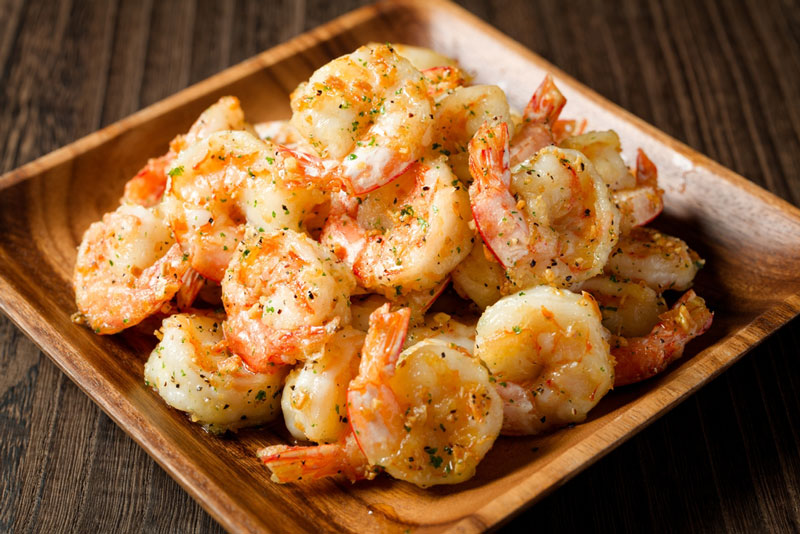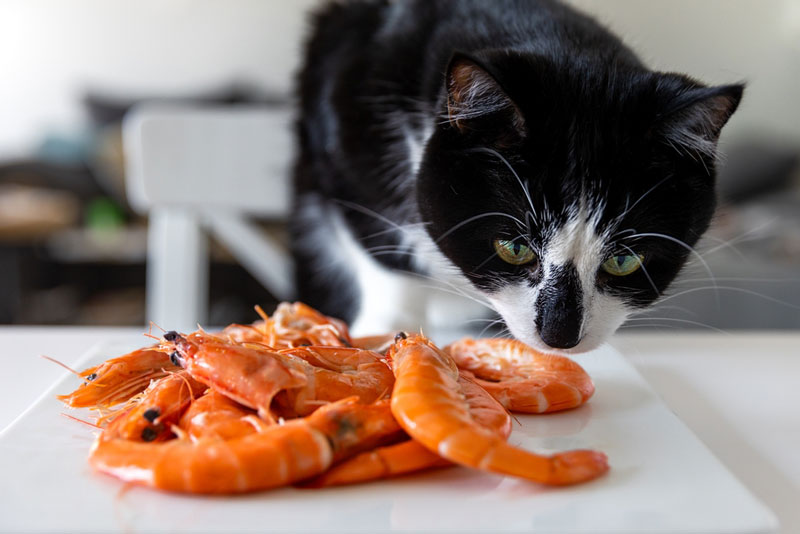Have you ever wondered if our furry friends, the cats, can indulge in some delicious shrimp? Well, the answer is yes, cats can eat shrimp! However, it’s important to make sure that shrimp is prepared correctly and offered in moderation to our feline companions. Cats are obligate carnivores, which means they thrive on protein and will enjoy a tasty seafood treat like shrimp.
Feeding shrimp to our cats can be a fun bonding experience and a tasty reward. Shrimp is not only a delectable food option, but it can also provide essential nutrients for our feline friends. Just like us, cats can appreciate a little variety in their diet. A little shrimp here and there can spice things up and bring a smile to their furry faces. However, we must remember that moderation is key.
So, are you curious about the fascinating world of shrimp for cats? Stick around, and we’ll explore its benefits, risks, and everything you need to know to serve up this seafood treat safely!
You might also be interested in: Can Cats Eat Sashimi?
Can Cats Eat Shrimp?

Yes, indeed! Cats can enjoy shrimp as an occasional treat. Shrimp is a type of shellfish that is rich in protein, making it a fitting snack for our feline friends. Many cats find the taste and smell of shrimp incredibly enticing. It’s a great way to add a bit of excitement to their diet. But before we rush to share our shrimp cocktail with our kitties, let’s ensure that we keep their health in mind.
When serving shrimp to our cats, it’s crucial to prepare it correctly. Always opt for cooked shrimp, as raw shrimp can contain harmful bacteria and toxins that may upset our cats’ stomachs. Unseasoned, plain shrimp is the best option. We should stay away from shrimp cooked with garlic, onion, or other spices, as these can be toxic to our furry friends. Also, be sure to remove the shell and tail, as they may pose a choking hazard. Keeping these things in mind ensures that we provide our cats with a safe and tasty treat!
How Much Shrimp Can Cats Eat?
When it comes to how much shrimp we can give our feline companions, moderation is the name of the game. A good rule of thumb is to stick to small portions when feeding shrimp to our cats. It’s always best to introduce any new food into their diet gradually. Start by offering a small piece of cooked, unseasoned shrimp and observe how they respond.
Generally, we should limit shrimp to about one or two small pieces once or twice a week. Overindulging in shrimp may lead to an upset tummy or other gastrointestinal issues. Since shrimp is high in protein, a little goes a long way in satisfying their cravings. We need to keep in mind that our cats’ main diet should consist of high-quality cat food, which provides them with all the essential nutrients they require.
It’s important to remember that every cat is different. Some cats might have sensitive stomachs or allergies, which could cause adverse reactions to shrimp. This is why it’s helpful to monitor our cats closely after introducing shrimp to their menu. If they seem to enjoy it without any negative reactions, then we can feel more confident offering it as a fun treat.
In the end, we want to ensure that our cats enjoy shrimp safely and that we respect their individual dietary needs. Keeping shrimp as a special treat means our cats can enjoy the delightful flavor, but it ensures that their overall health stays on track. We can be sure our furry friends have a happy and healthy life with the right approach!
Benefits Of Shrimp To Cats
1. Protein Powerhouse: Shrimp is packed with protein, which is essential for our cats’ overall health. Protein plays a vital role in building and repairing tissues, supporting muscle growth, and providing energy. Since cats are obligate carnivores, they thrive on diets rich in meat and fish. Incorporating shrimp can help balance their protein intake, making mealtime more satisfying.
2. Nutrient-Rich: Shrimp is not just about protein; it also contains several vitamins and minerals that contribute to our cats’ well-being. It includes vitamin B12, which supports healthy red blood cells, and selenium, an essential mineral that promotes a strong immune system. Having this variety on their plate can be a fantastic way to ensure they are getting the nutrients they need.
3. Low in Calories: For cats who need to maintain a healthy weight, shrimp can be a guilt-free treat. It is relatively low in calories compared to other protein sources, making it an excellent option for those kitties who are watching their waistlines. We appreciate that shrimp is a delicious and low-calorie alternative to more fatty foods!
4. Omega-3 Fatty Acids: Shrimp are known to contain omega-3 fatty acids, which have numerous health benefits for our feline companions. Omega-3s can help support a healthy coat, reduce inflammation, and promote heart health. By incorporating shrimp into their diet, we can help our cats maintain a shiny coat that gleams in the sunlight!
5. Tasty Treat: Let’s be honest—cats love variety in their diets, just like we do! Shrimp can make mealtime exciting and add flavor to our cats’ regular diet. Many cats enjoy the taste and texture of shrimp, making it a delightful treat to serve as an occasional reward or a special snack when they have been particularly good.
Dangers Of Feeding Shrimp To Cats
While shrimp can be a delicious treat for our feline friends, we should also be aware of the potential risks. Understanding these dangers ensures that we can provide our cats with a safe experience while enjoying shrimp. It helps to prioritize their health and well-being.
One significant risk is the possibility of allergic reactions. Just like humans, some cats may have allergies to shellfish, including shrimp. Watching our pets closely for any signs of distress, such as vomiting, diarrhea, or excessive scratching after eating shrimp, is crucial. If any of these symptoms appear, it’s best to discontinue feeding shrimp and consult our veterinarian.
Another concern is the preparation of shrimp. We must ensure that we only serve cooked, unseasoned shrimp. Raw shrimp can contain harmful bacteria like Vibrio, which can lead to severe gastrointestinal issues. Cooking shrimp kills these bacteria, making it safe for our pets to consume.
Additionally, when we remove the shrimp shell and tail for our cats, we need to be cautious. Pieces that are not well removed can pose a choking hazard, especially in smaller cats. Therefore, taking the time to prepare shrimp properly and serving it in manageable pieces can prevent choking incidents.
Finally, overfeeding shrimp could lead to digestive disturbance. With a high protein content, too much shrimp in our cats’ diets can result in an upset stomach or diarrhea. Moderation is vital as we introduce this seafood delicacy into their diet. By keeping the portion sizes small and treating shrimp as an occasional snack, we can enjoy the delightful taste of shrimp without worrying about our kitties’ health.
Substitute Of Shrimp For Cats
1. Fish: Cats often adore fish! It’s another excellent source of protein and offers many of the same benefits as shrimp. Try feeding our cats cooked, unseasoned fish like salmon, tuna, or cod. These options can help keep mealtime exciting while still offering essential nutrients.
2. Chicken: Cooked chicken is a classic favorite among feline companions. It’s easy to prepare, high in protein, and can be a more available alternative to shrimp. Just be sure to remove any seasoning or bones to keep our cats safe and healthy.
3. Turkey: Just like chicken, turkey can be a delicious addition to our cats’ diets. Cooked turkey provides protein and variety without the risks associated with shellfish. It is a lean meat option that many cats enjoy, making mealtime more enjoyable.
4. Eggs: For a protein punch, consider scrambled eggs! Eggs are full of protein and can be served in small amounts. Make sure they are cooked without any seasoning for optimal safety. This versatile ingredient can be a wholesome addition to our cats’ occasional treat rotation.
5. Specialized Cat Treats: There are plenty of store-bought cat treats that offer the same tasty experience as shrimp. Many brands create shrimp-flavored treats and snacks that are specifically formulated for cats, making them both safe and enticing to our furry friends!
Can Cats Eat Shrimp? Frequently Asked Questions
Can My Cat Eat Shrimp Every Day?
It is best to limit shrimp to once or twice a week. Cats should have a balanced diet of cat food, and shrimp should only be enjoyed as a special treat.
Is Shrimp Safe For Kittens?
Kittens may have more sensitive stomachs, so it’s wise to consult a veterinarian before introducing shrimp and other new foods to their diet.
What If My Cat Doesn’t Like Shrimp?
Every cat has its taste preferences. If they don’t like shrimp, it’s totally fine! There are plenty of other protein sources that they may enjoy more.
Can Shrimp Help With My Cat’s Dry Skin?
The omega-3 fatty acids found in shrimp can promote healthy skin and coat. However, if our cat has ongoing skin issues, it’s best to consult with a veterinarian for specific recommendations.
Should I Feed My Cat Raw Shrimp?
Raw shrimp is not safe for our cats due to harmful bacteria. Always cook shrimp thoroughly before serving it.
Final Thoughts
Feeding shrimp to our cats can be a rewarding experience when done safely and in moderation. With its protein-rich content and unique taste, shrimp can add a little excitement to our cats’ mealtimes while providing them with essential nutrients. However, it’s vital to keep their health and safety a priority by preparing shrimp correctly and being mindful of portion sizes.
With the right approach, we can enjoy the tasty seafood treat with our feline companions! If you’re looking to explore more about other foods suitable for pets, check out our blog where we discuss topics ranging from “Can Cats Eat Jelly?” to “Can Cats Eat Salmon Raw?” Your journey into cat nutrition doesn’t have to end here! Happy feeding!


